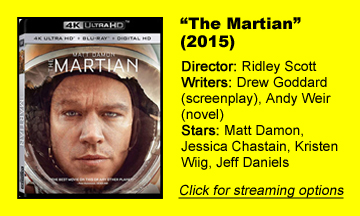The story of “The Martian’s” publication is as good as the book itself, maybe even better. Computer programmer and amateur author Andy Weir published it on his website as a serial novel starting in 2009, then as an e-book in 2011, and then – when a traditional publisher saw its success – as a printed novel in 2014. The Ridley Scott-directed film (more on that below) came out one year later.
By-the-numbers novel
Weir, who has since published a second novel, is a successful enough author now that I can say it: “The Martian” is good but not great. Rather surprisingly for a No. 1 New York Times bestseller, it’s heavy on mathematics and science as Mark Watney works to survive on Mars and put himself in position to be rescued.
Weir takes us into the science in blunt fashion. While the first-person narration of the likable, self-deprecating Watney provides some zest, the author doesn’t do the Michael Crichton thing of making the science ominous and having it connect with a layman. I’m always aware I’m reading the work of a first-time author.
“The Martian” is easy to read but never deep (outside of the science itself); at its high points, it reminds me of Arthur C. Clarke in the way it predicts the near future of space travel but doesn’t leave you with memorable characters.
Except, in this case, the main one, which is an admittedly effective cheat: Watney is no doubt Weir himself, as the author both presents and solves the problems of being stranded on Mars.
For a change of pace, it’s nice to cut back to Watney’s colleagues in the Hermes spacecraft – which accidentally leaves him behind, thinking he is dead – and the NASA staff on Earth. It gives us a reprieve from the survival story. But none of these people pop off the page; they are names and jobs.
An upbeat survival story
Mark’s survival story is remarkably upbeat; Weir goes for long stretches without something going wrong for Watney. This is refreshing, especially since I recently read “The Terror,” which is at the other end of the spectrum as it chronicles one disaster after another on an Arctic expedition. But Mark’s success rate also flattens out “The Martian.”
I’m left with the impression that a scientist with Watney’s precise skill set and demeanor could survive on Mars long enough for rescue. I take this in as a raw fact rather than as a remarkable observation about something in Mark’s inner being or humanity at large.
Then again, maybe I shouldn’t be so hard on a book that celebrates knowledge and problem-solving at the expense of all else.
Besides, for something that tugs at the heartstrings more, there’s always the movie adaptation …
The story comes alive
Continuing Weir’s rags-to-riches story, “The Martian” was adapted in 2015 by legendary director Scott and well-regarded screenwriter Drew Goddard, with Matt Damon in the title role. This is where Weir’s story – although faithfully adapted – comes alive.

On the page, Mars is just plain bleak; Watney regularly curses the place. On screen, it’s hauntingly, beautifully bleak – the desert of Jordan stands in for the Red Planet — and outright scary in the opening storm sequence that “kills” Mark. Scott shoots it in almost pitch-black with static-like particles rushing past, lit only by helmet lights. This isn’t merely a storm, it’s an alien storm.
The all-star cast is led by Damon, who — in a weird bit of temporary typecasting — played a stranded astronaut one year earlier in “Interstellar.” He carries the film the way Tom Hanks carries “Cast Away.”
Especially effective are his emotional breakdowns and moments of reflection, which are rare or underplayed in the book, as well as darkly humorous signs that he’s losing his mind, like when he insists on being known as the space pirate Captain Blondbeard in his communications with NASA.
Skillfully cutting to a skinnier actor, “The Martian” also shows how Watney has lost weight because of the emergency ration reduction.
Connection to humanity
The supporting cast comes to life in the movie, emphasizing Mark’s connection to humanity on an individual level. He’s best buds with the pilot Martinez, infused with veteran calm by Michael Pena. Jessica Chastain, Kate Mara, Sebastian Stan and Aksel Hennie round out a convincingly tight crew on the Hermes.
While Jeff Daniels and Chiwetel Ejiofor provide the foundation as the NASA heads, memorable mini-arcs come from Mackenzie Davis (“Terminator: Dark Fate”) and Donald Glover (“Atlanta”) as low-level staffers. Davis’ Mindy discovers Mark’s survival with Martian satellite imagery and Glover’s Rich calculates a maneuver that will allow the Hermes to rescue Mark with the fuel they have.
In the climactic rescue sequence, Weir’s novel suggests an Iron Man maneuver wherein Watney will punch a hole in his suit and use the escaping air to propel himself, but the film actually goes through with it, giving us the thrilling spectacle of Chastain’s Lewis essentially catching Mark in space.
As Goddard, Scott and the actors add humanity to “The Martian,” they don’t sacrifice adherence to science and math – at least not in any way I noticed. Maybe some pickier viewers will notice things, but I’m pretty picky myself, having been jarred out of otherwise strong SF films like “Interstellar” and “Ad Astra” by the scientific cheats.
“The Martian” certainly builds on Weir’s novel with spectacle and performances. But it ultimately honors his work by turning it into one of the best hard SF films of this century, and one that we’ll still be referencing when mankind really does go to Mars.
Book: 3.5 stars
Movie: 5 stars


